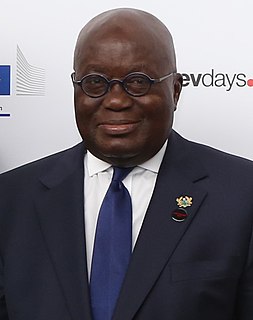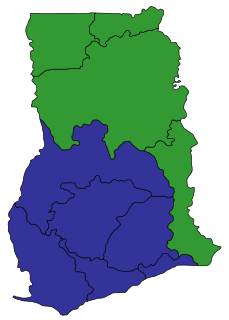
Jerry John Rawlings is a former Ghanaian military leader and politician who ruled the country from 1981 to 2001 and also for a brief period in 1979. He led a military junta until 1992 and then served two terms as the democratically elected President of Ghana.

The Parliament of Ghana is the legislative body of the Government of Ghana.

The Provisional National Defence Council (PNDC) was the name of the Ghanaian government after the People's National Party's elected government was overthrown by Jerry Rawlings, the former head of the Armed Forces Revolutionary Council, on 31 December 1981. It remained in power until 7 January 1993. In a statement explaining the coup d'état, Rawlings explained that a "holy war" was necessary due to the PNP's failure to provide effective leadership and the collapse of the national economy and state services.

Presidential elections were held in Ghana on 3 November 1992. The result was a victory for Jerry Rawlings, who won 58.4% of the vote. Voter turnout was 50.2%.

Nana Addo Dankwa Akufo-Addo is currently the President of Ghana. He has been in office since January 2017. He previously served as Attorney General from 2001 to 2003 and as Minister for Foreign Affairs from 2003 to 2007 under the Kuffuor led administration.

General elections were held in Ghana on 7 December 2000, with a second round of the presidential election on 28 December. The presidential elections resulted in a victory for John Kufuor of the New Patriotic Party (NPP), whilst the NPP also won the most seats in the parliamentary elections.
For the rapper with the same birth name, see V.I.C..

The Ghanaian parliamentary election was held on 29 December 1992. This were the first parliamentary elections since the 1979 election, 13 years earlier. Presidential elections were held earlier on 3 November 1992. Only 28.1% of the registered voters turned out for the parliamentary elections. The preceding presidential election was considered to have been conducted in a free and fair manner by international observers. The opposition parties however claimed the election was fraudulent and boycotted this parliamentary election.

General elections were held in Ghana on 7 December 1996. The presidential election resulted in a victory for the incumbent, Jerry Rawlings of the National Democratic Congress (NDC), whilst the NDC won 133 of the 200 seats in Parliament.

The Ghanaian parliamentary election was held on 29 August 1969. This was the first parliamentary election since the 1966 coup by the National Liberation Council which toppled the Nkrumah government, and the first relatively free election in the country's history.

The Democratic People's Party is a Ghanaian political party formed in 1992 after the ban on political party activity was lifted by the Provisional National Defence Council government of Ghana. The party claims to follow the Nkrumahist tradition along with the People's National Convention (PNC), Great Consolidated Popular Party (GCPP), National Reform Party (NRP) and the Convention People's Party (CPP).

General elections were held in Ghana on 7 December 2008. Since no candidate received more than 50% of the votes, a run-off election was held on 28 December 2008 between the two candidates who received the most votes, Nana Akufo-Addo and John Atta Mills. Mills was certified as the victor in the run-off election on January 3, 2009, by a margin of less than one percent. It is to date the closest election in Ghanaian history.
Frank George Bernasko was a retired Ghanaian soldier, lawyer, and politician. He served as the Commissioner of Agriculture among others in the National Redemption Council (NRC) military government of General I.K. Acheampong. He was also the founder and leader of the erstwhile Action Congress Party and contested the presidential election in 1979.
Imoru Ayarna was a Ghanaian businessman and politician. He was the founder and leader of the erstwhile People's Action Party in Ghana.

General elections were held in Ghana on Friday 7 December 2012 to elect a president and members of Parliament in 275 electoral constituencies. Owing to the breakdown of some biometric verification machines, some voters could not vote, and voting was extended to Saturday 8 December 2012. A run-off was scheduled for 28 December 2012 if no presidential candidate received an absolute majority of 50% plus one vote. Competing for presidency were incumbent president John Dramani Mahama of the National Democratic Congress (NDC), his main challenger Nana Akufo-Addo of the New Patriotic Party (NPP) and six other candidates.

General elections were held in Ghana on 7 December 2016 to elect a President and Members of Parliament. They had originally been scheduled for 7 November 2016, but the date was later rejected by Parliament. Former foreign minister Nana Akufo-Addo of the opposition New Patriotic Party was elected President on his third attempt, defeating incumbent President John Mahama of the National Democratic Congress.












